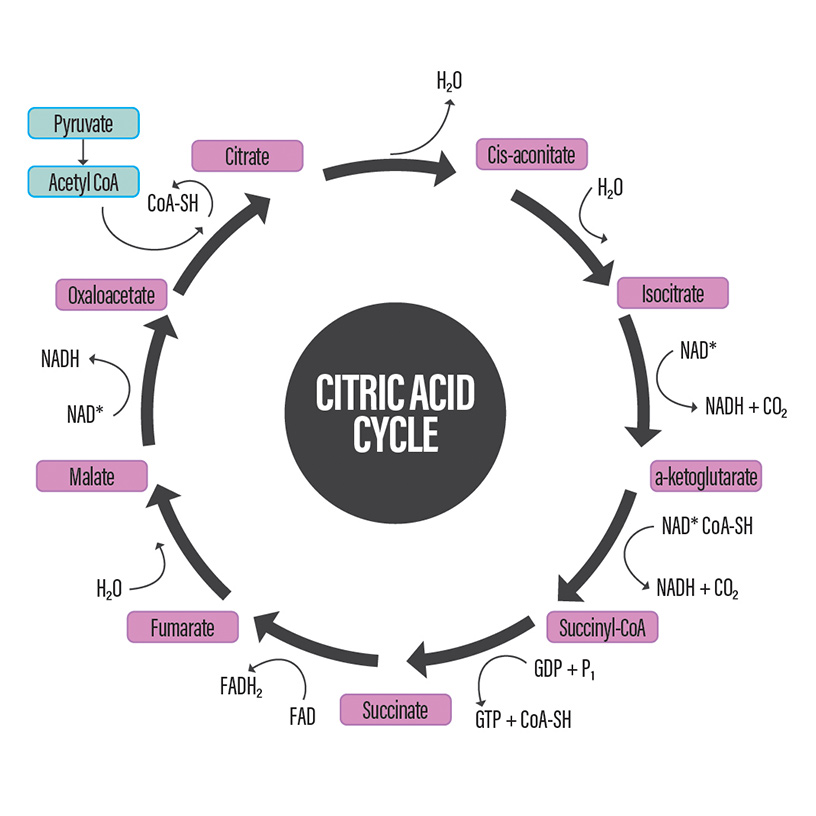Blog
What Are Organic Acids & How Are They Associated with Your Health?
Dr. Miranda Wiley, NDJune 8, 2017
Let’s take a moment to get technical about the word “organic”, we hear it often these days but what does it mean? And more importantly how does it contribute to organic acids and your health?
The Technical Terms “Organic & Organic Acids”:
In chemistry, the word “organic” simply refers to a molecule that contains a carbon atom. It does not refer to farming practices or foods where we traditionally hear this term. “Organic acids” are produced by various microbes, found in foods, or made by our own bodies through the metabolism of food molecules, nutrients, neurotransmitters, or toxins. They are not necessarily fixed in one state but readily changed and transformed as they influence, and are influenced by, various enzymes within cells. For example, doctors may look for homovanillic acid in the urine to assess dopamine levels in the body, which may be helpful in cases of suspected Parkinson’s disease.
Why are Organic Acids Important?
Now that we understand the chemical terminology for both the terms “organic” and “organic acids” let’s dive into why they are important. Organic acids may be tested to gain insights into how the body is functioning – nutrient levels, hormone function, and even the state of the microbiome which are immensely important for understanding our overall health. Today we’re going to stay focused on a handful of organic acids with known roles in improving and supporting our well-being. Some organic acids to note that are highly beneficial to human health are those that are nutrients themselves such as; Ascorbic acid (vitamin C) and amino acids: which create proteins and neurotransmitters, and fatty acids themselves.
Ascorbic acid is a well-known antioxidant. This means that it moves through our body looking for molecules that have been damaged by oxygen, and fixes them by neutralizing the oxidation. A slice of apple exposed to air will turn brown as it oxidizes, however, a squirt of lemon juice on it will prevent it from discoloring thanks to the antioxidant vitamin C in lemon juice.
Amino Acids
Amino acids are the building blocks of all of our tissues. When we exercise we cause microscopic damage to muscle cells, but when we sleep at night the body repairs the damage with amino acids from our diets creating a stronger muscle in the process. Amino acids are also the starting materials for neurotransmitters (tryptophan is used to make serotonin and melatonin, while tyrosine is used to make epinephrine, dopamine, and thyroid hormone), so we need to ensure regular intake of quality protein for both optimal mental and physical health.
Fatty Acids
Fatty acids are used for energy storage (the battle of the bulge!) but may have other properties too. For example, caprylic acid from coconut oil is anti-fungal and used in many a candida protocol.
Other Must Know Organic Acids
Other healthful organic acids are involved in the production of energy within the cell. Some of you may not be familiar with them at all, some may have vague memories of them from high school biology class, and some of you may be comfortable with them but unfamiliar of the full scope of their activities in the body.
So please bear with me as we quickly revisit Biology 101…
The body receives energy in the form of dietary fats, proteins, and carbohydrates, but arguably sugar (glucose) is the preferred form of energy for many cells. But for a teeny tiny little cell the amount of energy in just one molecule of glucose is overwhelming and excessive – like a surge nuclear power when all you want to do is turn on a lightbulb. So that single molecule of glucose needs to be broken down into “bite-sized” bits of energy that can be easily managed by the cell (think of how much easier it is to spend 100 Loonies while walking through a market than a single $100 bill. Loonies can be spent a little bit here, a little bit there…).
Citric Acid Cycle
The pathway by which that big lump of food energy is digested into smaller units is the Citric Acid Cycle (aka the Krebs cycle). Oxygen, enzymes and B vitamins work to alter organic acids into other organic acids in a continuous cycle, producing small units of energy for the cell, and releasing carbon dioxide in the process.
Foods that supply some of the organic acids used in the Citric acid cycle are therefore helping to feed the machinery that provide energy to the cell – and that means more energy for brain cells, muscle cells, liver cells, skin cells, and so on.
Citric acid is commonly found in a variety of other foods such as: strawberries, cherries, tomatoes, and pineapple (to varying degrees), but it can also be found in food additives. When used in food additives it is either to impart a sour taste to food or to lower the pH to prevent spoilage. While additives are a quick and easy way to get Citric acid into your system, it is not the most balanced way to go. When citric acid is consumed naturally through foods proper levels of citric acid are naturally obtained due to the combination of supporting nutrients in those foods. The same cannot be said about “balanced” absorption through additives that contain for example; a glut of citric acid from a sour candy without any supporting nutrients to assist its cellular roles.
Acetic Acid
Acetic acid is also a player in the citric acid cycle and therefore, also a factor in energy production for the cell. Most commonly known as the primary acid in vinegar, acetic acid has been shown to support enzymes that increase fat metabolism and reduce accumulation of fat1 (which may be why humans learned to put vinegar on fries! Unfortunately acetic acid doesn’t seem powerful enough to improve the quality of oil in fried foods, or magically turn them into health foods…but it may offset some of the impact).
Lactic acid, like acetic acid, is a common by-product of fermentation. It is found in fermented dairy products such as yogurt, kefir, and cheese as well as in sauerkraut, pickles, and other vegetables that have been pickled through fermentation. The bulk of our friendly microbiome is comprised of lactic acid bacteria that reside within us and ferment the foods we eat!
Conclusion
We are made of dozens of structural organic acids. Our food contains a wide range of organic acids that may be naturally present or added by the food industry. Our bodies are constantly creating, destroying, absorbing, and releasing organic acids. Choosing whole foods from a variety of sources, and being mindful of digestion when eating (turn the electronics off during meal time!) is the best way to ensure that our bodies receive the right balance of organic acids for optimal health and balance. Organic acids used as additives in food (ie. citric acid in drinks and candies) may throw off our subtle internal equilibrium and are one more reason on the list to avoid refined, chemically flavoured “non-foods”.
References:
1. https://www.ncbi.nlm.nih.gov/pubmed/19469536





